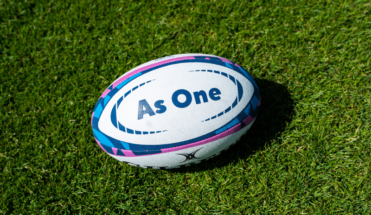Obituary: Ken Scotland
Scottish Rugby is immensely saddened to learn of the death of the former Scotland and British & Irish Lions full-back Ken Scotland this weekend. He was 86.
Kenneth James Forbes Scotland was a player ahead of his time, a true trailblazer.
He was also an absolute gentleman, as keen a student of the game today, to which he brought crystal-clear but kind thinking, as he was in his playing pomp.
To spend time in his company while watching his beloved Heriot’s at Goldenacre was one of the great privileges for anyone who loves the game.
As a player, he changed the narrative of what was expected of a full-back, bringing counter-attacking elan to the traditional steadying influence of the last line of defence.
Scotland, the great innovator, was the catalyst for some of the game’s greatest full-backs, such as JPR Williams and Andy Irvine, who were given licence to play the same exhilarating game that was Ken Scotland’s trademark.
Andy Irvine told the Scottish Rugby website: “ Ken was undoubtedly one of the greatest players ever to grace the rugby field and was one of the nicest chaps you could ever meet.
“As a schoolboy at George Heriots, he was my ultimate hero and when I played senior rugby in the FP side, I was so fortunate to receive personal coaching on full back play from Ken.
“He had a brilliant rugby brain and such a lovely manner in how he would explain his thoughts and ideas to assist players. Not only a great player but equally great coach.”
Born a decent punt from Goldenacre playing fields in Edinburgh in August 1936, Ken Scotland had an outstanding sporting record at George Heriot’s school, where he was captain of rugby, cricket and tennis.
A stand-off in his school days, winning Scottish Schools honours, he was playing in that position for the Army while he did his National Service with the Royal Corps of Signals at Catterick.
He played full-back as a substitute in the first Scotland trial of the 1956-57 season in Hawick and went on to make his Scotland debut in the opening match of the 1957 Five Nations Championship – against France at the Stade Colombes in Paris.
In filthy weather, Scotland, as a 20-year-old, was his country’s match-winner, landing a drop-goal and a penalty in the 6-0 victory.
He went on to win a total of 27 caps for Scotland over the ensuing eight years, contributing 71 points through 15 penalties, seven conversions and four drop-goals.
But it was the extra dimension that he brought to the full-back role, or the opportunity to have his fellow backs perform, when he orchestrated from stand-off as he did in two Scotland caps, that had opponents characterise him as a master.
When he captained Scotland for the first time – against France back at the Stade Colombes in 1963 – he was again the hero of the hour, scoring eight points, including the nerveless match-winning conversion of Ronnie Thomson’s try.
On the 1959 British & Irish Lions tour of Australia and New Zealand, Scotland scored 12 tries in the remarkable 22 appearances that made him the second most-played Lion on the Tour, including a hat-trick in the opening match against Hawke’s Bay and a spectacular solo effort that won the game against Thames Valley-Bay of Plenty.
The New Zealand Rugby Almanac rated him the Lion “most likely to win a match for his side” and named him as one of its five players of the year.
On that tour – in which he played five Test matches, two against Australia and three against New Zealand – not only did he flourish at full-back, but he lined up at centre in the final Test in Auckland, which the Lions won 9-6. He also featured at scrum-half in one game during that tour.
The previous year, Scotland was capped for his country at cricket, playing in the match against Ireland at Cambusdoon in Alloway.
In addition to representing the Army and Heriot’s, Scotland won Blues at Cambridge University, captaining his side to victory in the 1960 Varsity match. In a peripatetic rugby career, he also played the club game for University College Cork, Ballymena, Aberdeenshire, Leicester Tigers, Aberdeen GSFP, London Scottish and North & Midlands.
Understandably, he was a great favourite of the Barbarians, representing the invitational side on ten occasions, captaining them in a 3-all draw with Canada at Gosforth in 1962.
Scotland was among the first to be inducted into Scottish Rugby’s Hall of Fame when it was inaugurated in 2010.
His fellow Hall of Fame inductee, Chris Paterson, said today: “I never saw Ken play but I was well aware of his ability and influence, not only on what he achieved on the playing field, but by steering the very future of the game.
“He was absolutely a pioneer. I really enjoyed any opportunity we had to speak and I would be in awe of his sharp, analytical mind and his opinions on the modern game.
“Ken was a true gent who inspired and helped me in equal measure.”
Scottish Rugby extends its sincere condolences to Ken’s widow Doreen, all his family and many friends.
The memorial service is due to begin at Warriston Crematorium, Lorimer Chapel at 11am on Friday 20th January with all welcome.
Ken’s family have asked that people do not send flowers, rather make a donation in his memory to St Columbas Hospice, Edinburgh or My Name’5 Doddie foundation.
For those unable to attend the service there will also be a livestream via the link below:
https://www.wesleymedia.co.uk/webcast-view
PIN 548-5712
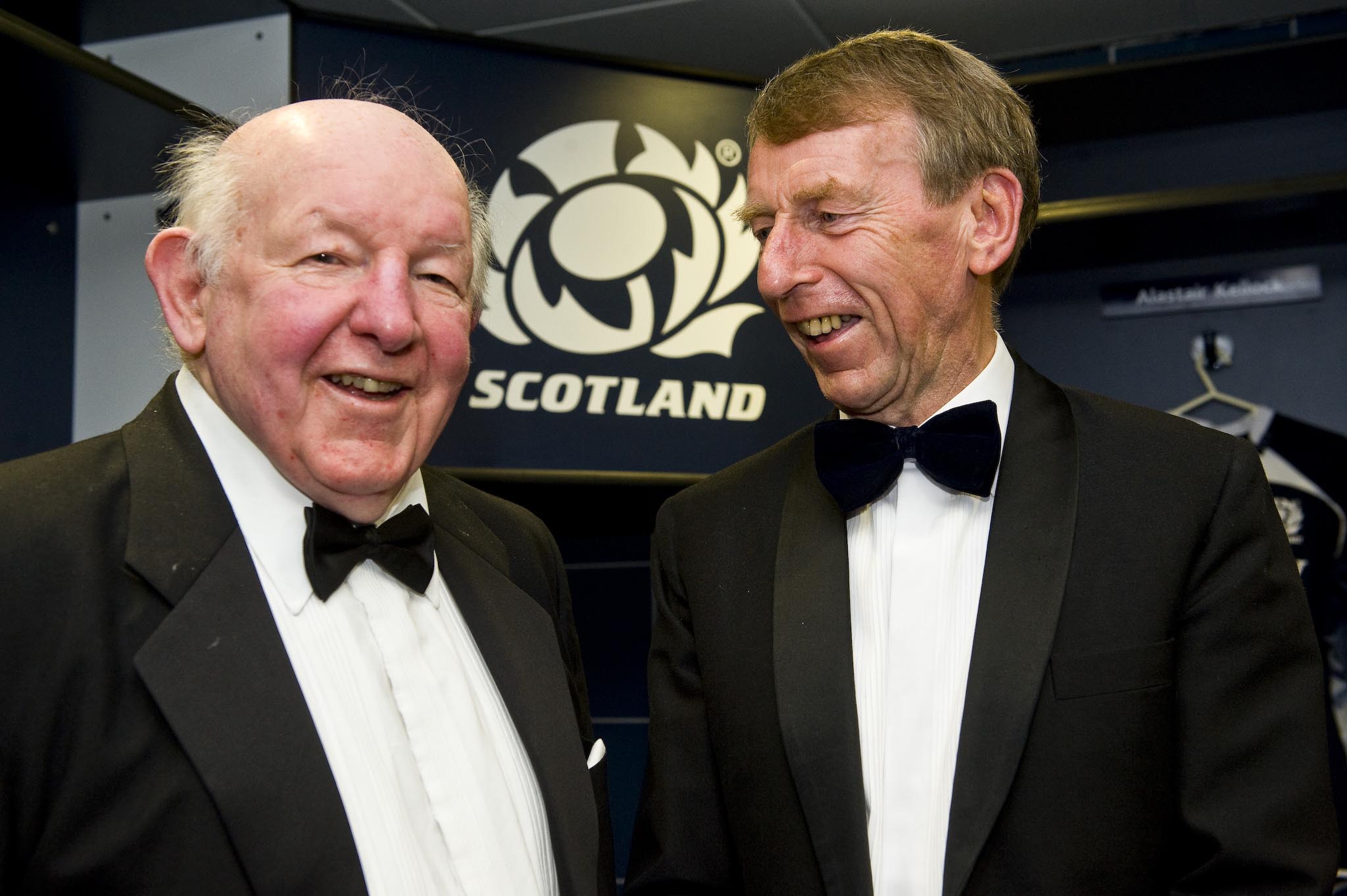
Ken Scotland chats with judge Norman Mair during the inaugural induction to the Scottish Rugby Hall of Fame.
Tags
Related news
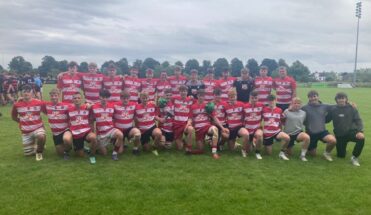
Regional academy sides in Stirling again for second festival
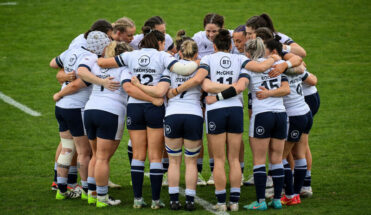
Easson names extended training squad and welcomes Fraser Brown to the coaching team ahead of Autumn Tests
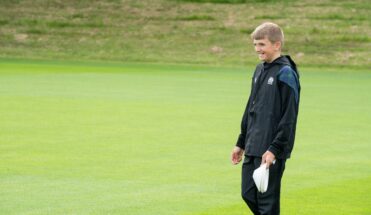
Young coach Ollie enjoys an unforgettable day in Scotland camp

Jones to reach milestone in Montevideo
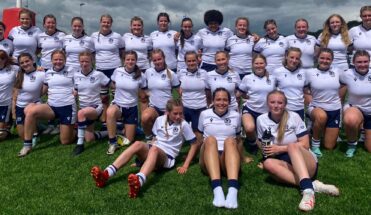
Women’s U18 Summer Festival Development | Day One review

Academy sides back in action for first festival of new season
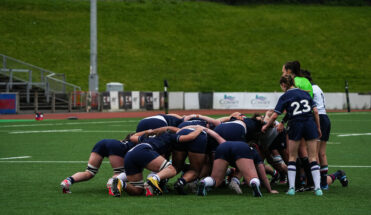
Scottish Rugby names Women’s U18 Development squad for week-long rugby festival
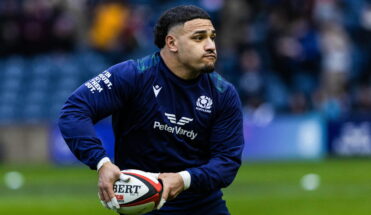
10 changes to Scotland starting XV to face Chile in Santiago
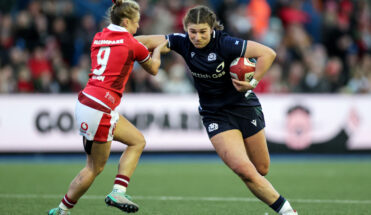
Scotland Women to host Wales and Fiji in Autumn Tests
